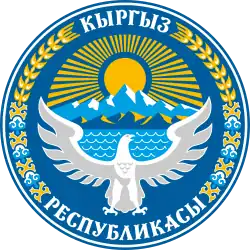 |
|---|
|
|
| Constitution |
The president, according to the constitution, "is the symbol of the unity of people and state power, and is the guarantor of the Constitution of the Kyrgyz Republic, and of an individual and citizen."
The office of president was established in 1990 replacing the Chairman of the Supreme Soviet that existed, in different forms, from 1936 whilst the country was known as the Kirghiz Soviet Socialist Republic. In 1919, the Kara-Kyrgyz Autonomous Oblast was created in Soviet Russia. This was the precursor to the Kirghiz Soviet Socialist Republic (commonly known as Kirghizia) which was established in 1936 as republic in its own right within the Union of Soviet Socialist Republics (USSR).
With the Soviet Union came electricity, water, irrigation, industrialization and literacy to Kyrgyzstan, and the other Soviet Central Asian countries. Scholars such as Alec Nove and J.A. Newth have argued that most development indicators suggests that the Soviet Muslim countries far-exceeded those Muslim countries outside the Soviet sphere of influence. The administrative, political and economic system was revolutionary by Kyrgiz standards, however, numerical indicators of development only partially supports this view, with one claiming that 63.2% of Kyrgyzstan's population still lived in rural areas. This was, however, the highest of any country in Central Asia. The country's higher urbanization rate is in large part because of its large Russian population, with most Europeans living in urban areas. Russian immigration slowed in 1959, the same year the national birth rate increased.[1] However, the indigenous population had for the most part been untouched by Sovietization, an example being that religion was still widespread.[2]
In spite of intense efforts to create socialism from "scratch", the social institutions led to infiltrations by religious, tribal and communal group into the political system. After the death of Joseph Stalin, the level of repression declined and less surveillance from the KGB and Moscow led to an increase in the importance of tribes in communal affairs.[2]
Kara-Kirghiz Autonomous Oblast (1924–1925) and Kirghiz Autonomous Oblast (1925–1926)
| Holders | Took office | Left office | Nationality | ||
|---|---|---|---|---|---|
| First Secretary of the Kirghiz Provincial Organization of the All-Union Communist Party | |||||
| M.D. Kamensky [3] |
1924 [3] |
1925 [3] |
Russian [3] | ||
| Nikolay Uzyukov [3] |
1925 [3] |
1926 | Russian [3] | ||
Kirghiz Autonomous Soviet Socialist Republic (1926–1936)
Heads of government
| Holders | Took office | Left office | |||
|---|---|---|---|---|---|
| Chairmen of the Council of People's Commissars | |||||
| Yusup Abdrakhmanov [4] |
March 12, 1927 [4] |
September 27, 1933 [4] | |||
| Bayaly Isakeyev [4] |
September 27, 1933 [4] |
December 5, 1936 [4] | |||
Heads of party
| Holders | Took office | Left office | Nationality | ||
|---|---|---|---|---|---|
| First Secretary of the Kirghiz Provincial Organization of the All-Union Communist Party | |||||
| Nikolay Uzyukov [3] |
1926 [3] |
1927 [3] |
Russian [3] | ||
| Vladimir Shubrikov [3] |
1927 [3] |
1929 [3] |
Russian [3] | ||
| Mikhail Kulkov [3] |
1929 [3] |
1930 [3] |
Russian [3] | ||
| Aleksandr Shakhray [3] |
1930 [3] |
1934 [3] |
Russian [3] | ||
| Moris Belotsky [3] |
1934 [3] |
December 5, 1936 [4] |
Jewish [3] | ||
Heads of state
| Holders | Took office | Left office | |||
|---|---|---|---|---|---|
| Chairmen of the Central Executive Committee | |||||
| Abdukadyr Urazbekov [4] |
March 12, 1927 [4] |
December 5, 1936 [4] | |||
Kirghiz Soviet Socialist Republic (1936–1991)
Heads of government
| Holders | Took office | Left office | |||
|---|---|---|---|---|---|
| Chairmen of the Council of People's Commissars | |||||
| Bayaly Isakeyev [4] |
December 5, 1936 [4] |
September 8, 1937 [4] | |||
| Murat Salikhov [4] |
September 8, 1937 [4] |
February 15, 1938 [4] | |||
| Ismail Abuzyarov [4] |
February 15, 1938 [4] |
April 27, 1938 [4] | |||
| Ivan Rebrov [4] |
April 27, 1938 [4] |
July 19, 1938 [4] | |||
| Turabay Kulatov [4] |
July 19, 1938 [4] |
November 14, 1945 [4] | |||
| Iskhak Razzakov [4] |
November 14, 1945 [4] |
July 10, 1950 [4] | |||
| Chairmen of the Council of Ministers | |||||
| Abdy Suyerkulov [4] |
July 10, 1950 [4] |
March 6, 1958 [4] | |||
| Kazy Dikambayev [4] |
March 6, 1958 [4] |
May 10, 1961 [4] | |||
| Bolot Mambetov [4] |
May 16, 1961 [4] |
January 23, 1968 [4] | |||
| Akhmatbek Suyumbayev [4] |
January 23, 1968 [4] |
December 22, 1978 [4] | |||
| Sultan Ibraimov [4] |
December 22, 1978 [4] |
December 4, 1980 [4] | |||
| Pyotr Khodos [4] |
December 4, 1980 [4] |
January 21, 1981 [4] | |||
| Arstanbek Duysheyev [4] |
January 21, 1981 [4] |
May 20, 1986 [4] | |||
| Apas Jumagulov [4] |
May 20, 1986 [4] |
21 Jan 1991 [4] | |||
Heads of party
| Holders | Took office | Left office | Nationality | ||
|---|---|---|---|---|---|
| Chairmen of the Central Executive Committee | |||||
| Moris Belotsky [3] |
December 5, 1936 | March 1937 | Jewish [3] | ||
| First Secretary of the Communist Party of Kirghizia | |||||
| Maksim Ammosov [5] |
April 23, 1937 [4] |
February 20, 1938 [4] |
Russian [3] | ||
| Aleksey Vagov [5] |
February 20, 1938 [5] |
July 1945 [5] |
Russian [3] | ||
| Nikolay Bogolyubov [6] |
July 1945 [5] |
July 7, 1950 [4] |
Kyrgyz [3] | ||
| Iskhak Razzakov [7] |
July 7, 1950 [4] |
May 9, 1961 [4] |
Kyrgyz [3] | ||
| Turdakun Usubaliyev [8] |
May 9, 1961 [4] |
November 2, 1985 [4] |
Kyrgyz [3] | ||
| Absamat Masaliyev [8] |
November 2, 1985 [4] |
April 6, 1991 [4] |
Kyrgyz [3] | ||
| Jumgalbek Amanbayev [8] |
April 6, 1991 [4] |
August 29, 1991 [4] |
Kyrgyz [3] | ||
Heads of state
| Holders | Took office | Left office | |||
|---|---|---|---|---|---|
| Chairmen of the Central Executive Committee | |||||
| Abdukadyr Urazbekov [4] |
1936 [4] |
September 16, 1937 [4] | |||
| Mikhail Us [4] |
September 16, 1937 [4] |
October 4, 1937 [4] | |||
| Maryam Tugambayeva [4] |
September 16, 1937 [4] |
October 4, 1937 [4] | |||
| Sultankul Shamurzin [4] |
October 4, 1937 [4] |
December 16, 1937 [4] | |||
| Ivan Sokolov [4] |
December 16, 1937 [4] |
February 15, 1938 [4] | |||
| Murat Salikhov [4] |
February 15, 1938 [4] |
May 15, 1938 [4] | |||
| Kalima Amankulova [4] |
May 15, 1938 [4] |
July 18, 1938 [4] | |||
| Chairman of the Supreme Soviet | |||||
| I.P. Boryak [4] |
July 18, 1938 [4] |
July 19, 1938 [4] | |||
| Chairmen of the Presidium of the Supreme Soviet | |||||
| Asanaly Tolubayev [4] |
July 18, 1938 [4] |
March 22, 1943 [4] | |||
| Moldogazy Tokobayev [4] |
March 22, 1943 [4] |
November 14, 1945 [4] | |||
| Turabay Kulatov [4] |
November 14, 1945 [4] |
August 25, 1978 [4] | |||
| Sultan Ibraimov [4] |
August 25, 1978 [4] |
December 22, 1978 [4] | |||
| Andrey Buss [4] |
December 22, 1978 [4] |
January 10, 1979 [4] | |||
| Arstanbek Duysheyev | January 10, 1979 [4] |
January 14, 1981 [4] | |||
| Temirbek Koshoyev [4] |
January 14, 1981 [4] |
August 8, 1987 [4] | |||
| Tashtanbek Akmatov [4] |
August 8, 1987 [4] |
April 10, 1990 [4] | |||
| Chairman of the Supreme Soviet | |||||
| Absamat Masaliyev [4] |
April 10, 1990 [4] |
October 27, 1990 [4] | |||
| President of Kyrgyzstan | |||||
| Askar Akayev [3] |
October 27, 1990 | December 25, 1991 | |||
List of presidents of Kyrgyzstan
The first column consecutively numbers the individuals who have served as president, while the second column consecutively numbers the presidential terms or administrations.
| No | Name (Birth–Death) |
Picture | Took office | Left office | Elected | Political party |
|---|---|---|---|---|---|---|
| 1 | Askar Akayev (1944–) |
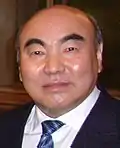 |
27 October 1990 | 30 December 1995 | 1990/91 | Independent |
| 30 December 1995 | 9 December 2000 | 1995 | ||||
| 9 December 2000 | 24 March 2005 (ousted) |
2000 | ||||
| – | Ishenbai Kadyrbekov (1949–) |
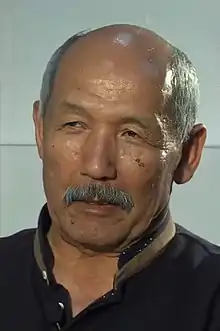 |
24 March 2005 | 25 March 2005 | Independent | |
| – | Kurmanbek Bakiyev (1949–) |
.jpg.webp) |
25 March 2005 | 14 August 2005 | Independent | |
| 2 | 14 August 2005 | 15 October 2007 | 2005 | People's Movement of Kyrgyzstan | ||
| 15 October 2007 | 2 August 2009 | Ak Jol | ||||
| 2 August 2009 | 7 April 2010 (ousted) |
2009 | ||||
| – | Roza Otunbayeva (1950–) |
 |
7 April 2010 | 3 July 2010 | Social Democratic Party of Kyrgyzstan | |
| 3 | 3 July 2010 | 1 December 2011 | ||||
| 4 | Almazbek Atambayev (1956–) |
.jpg.webp) |
1 December 2011 | 24 November 2017 | 2011 | Social Democratic Party of Kyrgyzstan |
| 5 | Sooronbay Jeenbekov (1958–) |
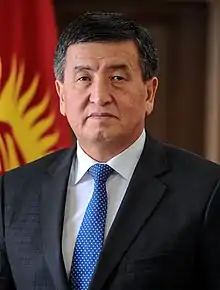 |
24 November 2017 | 15 October 2020 (ousted) |
2017 | Social Democratic Party of Kyrgyzstan |
| – | Sadyr Japarov (1968–) |
.jpg.webp) |
16 October 2020 | 14 November 2020 | Mekenchil | |
| – | Talant Mamytov
(1976–) |
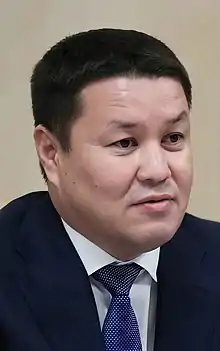 |
14 November 2020 | 27 January 2021 | Kyrgyzstan | |
| 6 | Sadyr Japarov (1968–) |
.jpg.webp) |
28 January 2021 | Incumbent | 2021 | Mekenchil |
See also
References
Notes
- ↑ Collins 2006, pp. 83.
- 1 2 Collins 2006, pp. 84.
- 1 2 3 4 5 6 7 8 9 10 11 12 13 14 15 16 17 18 19 20 21 22 23 24 25 26 27 28 29 30 31 32 33 34 35 36 Collins 2006, pp. 109.
- 1 2 3 4 5 6 7 8 9 10 11 12 13 14 15 16 17 18 19 20 21 22 23 24 25 26 27 28 29 30 31 32 33 34 35 36 37 38 39 40 41 42 43 44 45 46 47 48 49 50 51 52 53 54 55 56 57 58 59 60 61 62 63 64 65 66 67 68 69 70 71 72 73 74 75 76 77 78 79 80 81 82 83 84 85 86 87 88 89 90 91 92 93 94 95 96 97 98 99 100 101 102 103 104 105 106 107 108 109 110 111 112 113 "Soviet republics: Kirgiz S.S.R." Rulers.org.
- 1 2 3 4 5 Mohapatra, Nalin Kumar (2006). Political Culture and Democratic Development in Central Asia. University of Michigan: Bookwell. p. 53. ISBN 81-89640-17-8.
- ↑ Abazov, Rafis (2004). Historical Dictionary of Kyrgyzstan. Scarecrow Press. p. 340. ISBN 0-8108-4868-6.
- ↑ Institute for Central Asian and Caucasian Studies (2006). Central Eurasia: Analytical Annual. CA&CC Press. p. 184. ISBN 91-976993-1-4.
- 1 2 3 Eastern Europe and the Commonwealth of Independent States. Vol. 4. Routledge. 1999. p. 446. ISBN 1-85743-058-1.
Bibliography
- Collins, Kathleens (2006). Clan Politics and Regime Transition in Central Asia. Cambridge University Press. p. 376. ISBN 0-521-83950-5.